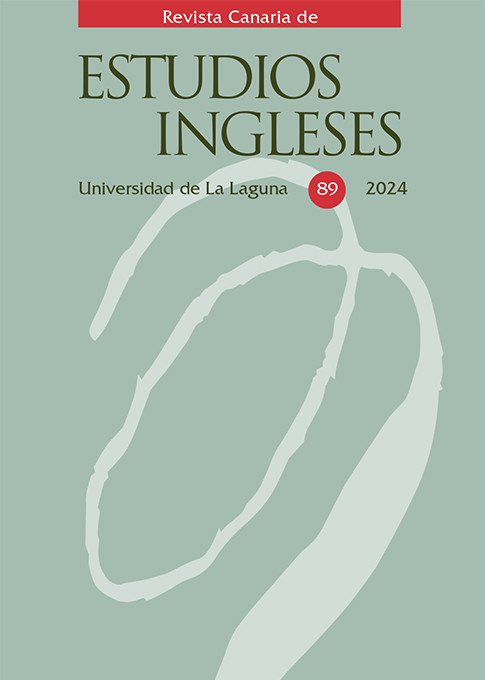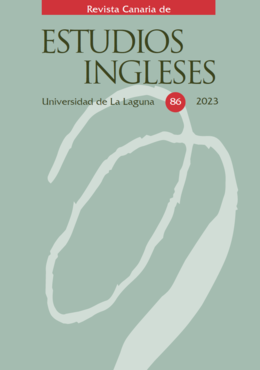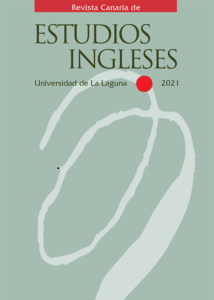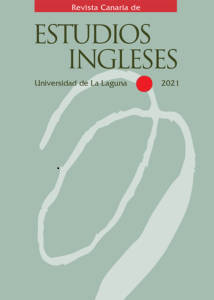e-ISSN: 0211-5913
DOI: 10.25145/j.recaesin
-
 Critical Animal Studies
No 90 (2025)
Critical Animal Studies
No 90 (2025)The Animal Turn in literary and cultural studies has brought about a paradigm shift in the way human animals have started thinking about other-thanhuman animals and the many forms humanimal relationships take. Critical Animal Studies scholars meet animals as subjects gifted with agency, eloquence, independent existential narrative and who are owners of their own physical and emotional territories. The articles in this special issue look into some of the ways in which the human animal has looked at, perceived, (mis)understood, and represented nonhuman animals in written and filmic texts. Their analyses challenge traditional anthropocentric perspectives and reveal the extraordinary potential of literature and other artistic discourses to affect humans’ treatment of animals. In the pages that follow, readers will encounter and be invited to think with cats, performing dogs and horses, captive orcas, rodents, insects, and imaginary dragons; question the ethics of animal suffering at the hands of humans in laboratories and slaughterhouses; and confront the moral implications of human actions towards nonhuman beings.
-
 Ecogothic, Monstrosity, and Climate Emergency
No 89 (2024)
Ecogothic, Monstrosity, and Climate Emergency
No 89 (2024)This issue introduces several essays which apply ecogothic as a theoretical framework to discuss literature and film. Scholars attempt to provide a state of the art in the evolution of the relationship between the human and the more than human in terms of fear. Thus, questions of alterity, climate emergency and the presence of the supernatural are explored in relationship with monstrosity and decolonial thinking advocating for a more posthuman attitude towards all Earth dwellers.
-
 A Multiple and International West: History and Prospects of Western American Studies
No 88 (2024)
A Multiple and International West: History and Prospects of Western American Studies
No 88 (2024)The West is at the very heart of the foundation of American identity and its history and culture are still springs for academic reflection when researchers aim at understanding the past, present and future of American identity. The West is where the sun sets and its myth draws an across-the-world shadow. The forthcoming essays offer a panoramic view of Western studies, with a stress on the international accent that has characterized this field in recent years.
-
 Manuscript Studies: Past, Present and Future of an Evolving Discipline
No 87 (2023)
Manuscript Studies: Past, Present and Future of an Evolving Discipline
No 87 (2023)The articles in this special issue show the many possibilities that the study of manuscripts offers across different subject areas and fully demonstrate the significance and impact of manuscripts on all realms of medieval and modern life, i.e., medical, political, private, etc. The issue will be helpful for readers to visualise some of the lines of research carried out within the label of Manuscript Studies.
-
 Toxic Tales: Narratives of Waste in Postindustrial North America
No 86 (2023)
Toxic Tales: Narratives of Waste in Postindustrial North America
No 86 (2023)This special issue shines a light on the manifold “narratives of waste” that have proliferated in recent years in North America, responding to the urgent need to explore stories dealing with waste in its myriad incarnations. The “toxic tales” presented will hopefully exemplify the multiple forms through which the wastification process is achieved.
-
 The Waste Land: A Hundred Years Later
No 85 (2022)
The Waste Land: A Hundred Years Later
No 85 (2022)This issue commemorates the centenary of T.S. Eliot’s The Waste Land, a monument of modernist verse, offering new global perspectives of this epochal poem, one that has become a hallmark of modernity, and which remains an icon of our postmodern age. It is divided into two parts: Part I comprises fourteen critical, scholarly essays of international and cross-cultural perspectives on Eliot’s poem, covering areas of interest ranging from poetry criticism to literary theory, translation studies and philosophy. Part II is dedicated to creative artwork, including poetry written by four poets from the USA, Spain and Mexico, paintings by two artists from Germany and Spain, and a special section on music (the recording of a recital titled “Then Spoke the Waste Land: Songs and Fragments,” performed in 2022).
-
 Fiction of the Roaring Twenties: 100 Years Later
No 84 (2022)
Fiction of the Roaring Twenties: 100 Years Later
No 84 (2022)This monography enriches the extant bibliography of the literature of the roaring twenties with new perspectives. Scholars from Spain, Germany, and Romania, who are at different stages of their career and who rely on different methodologies, look at the 1920s and their echo in the fiction of the time.
-
 Cultural Representations of India and Indian Diasporas on Screen
No 83 (2021)
Cultural Representations of India and Indian Diasporas on Screen
No 83 (2021)This special issue, devoted to “Cultural Representations of India and Indian Diasporas on Screen,” includes fourteen research papers, two interviews, four pieces of creative writing and three reviews that aim to assess and revisit portrayals of India and its diasporas on screen through different genres.
-
 Indian Ocean Imaginaries
No 82 (2021)
Indian Ocean Imaginaries
No 82 (2021)This volume, edited by Esther Pujolràs Noguer and Juan Ignacio Oliva, is devoted to Indian Ocean Literatures and Cultures, tracing a mosaic of the diversity, richness and multicultural identities that permeate their imaginaries.
-
 Contemporary Challenges in Chicanx Literature & Culture
No 81 (2020)
Contemporary Challenges in Chicanx Literature & Culture
No 81 (2020)This issue, edited by Francisco A. Lomelí, Sophia Emmanouilidou and Juan Ignacio Oliva, is devoted to Contemporary Challenges in Chicanx Literature and Culture, with some incursions into Latinx authors. The reader will find an ample selection of innovative critical analyses and also creative works, a tribute and an addendum essay. Topics like gender studies, music, human rights, border traumas, ideology and culture are offered to show the vitality of the Chicanx polyphonic vision of the US (and by extension of the Occidental world); one capable of transforming centric attitudes and decoding hegemonic positions.
-
 A Philologist World of Words: The Medievalist, the Functionalist, the African Explorer
No 80 (2020)
A Philologist World of Words: The Medievalist, the Functionalist, the African Explorer
No 80 (2020)This volume celebrates the forty years of life of RCEI, devoting its contents to the figure of Prof. José S. Gómez Soliño. His works on Historical Linguistics, Functional (Discourse) Grammar and African Studies are measured by the recognition received outside the limits of the Canarian archipelago. A representative group of scholars, contemporary colleagues and former disciples, participate in this tribute with contributions related to the three mail fields of interest of Prof. Gómez Soliño.
-
 Restoration Fiction (1660-1714)
No 79 (2019)
Restoration Fiction (1660-1714)
No 79 (2019)This special issue on “Restoration Fiction (1660-1714)” hopes to contribute to further discern the achievements of this traditionally neglected period of the English novel, offering a glimpse into the literary richness and potential of mid- and late-seventeenth-century fiction.
-
 Canadian Fictions of Globality
No 78 (2019)
Canadian Fictions of Globality
No 78 (2019)This issue entitled “Canadian Fictions of Globality” aims at analyzing how a minute, singled-out field of sociological overtones ingrained in the dynamics of globalization is being engaged within the fictional (and critical) literary production ascribed to present-day Canada. The scholarly responses tackle globality from various angles: is it a condition of the postmodern present? Is globality a fiction of newness worth appending to cultural manifestations for marketing purposes? Is the presumed irrelevance of borders so apparent? Which new mechanisms are adopted to demarcate community boundaries anew after their transgression? The Canadian narratives selected by the contributors for this volume embody a groundwork for the materialization of global imaginaries and a plethora of answers to the questions above.
-
 Natura Loquens, Natura Agens: In Dialogue and Interaction with the Environment
No 77 (2018)
Natura Loquens, Natura Agens: In Dialogue and Interaction with the Environment
No 77 (2018)A series of articles that closely focused on the communicative/dialogical relationship between humans and Nature, and the agency of Nature. The issue examines old and new understandings of the agency of Nature/matter, and of what counts as speech. The issue also juxtaposes the premodern idea of a ‘language of nature’ as featured in aesthetics and literature in the 18th and 19th centuries with the new understandings of the concept in the context of ecocritical debates on nature’s agency.
-
 Partition and its Aftershocks: South Asian Cultural and Literary Throbs, Seventy Years On
No 76 (2018)
Partition and its Aftershocks: South Asian Cultural and Literary Throbs, Seventy Years On
No 76 (2018)This special issue is devoted to British India’s Partition and its effects in literature, culture, language and the other fields in the scope of the journal, offering thoughts about Partition as a process more than an historical event.
-
 Practices in Intercultural Mediation: Public Service Interpreting in Perspective
No 75 (2017)
Practices in Intercultural Mediation: Public Service Interpreting in Perspective
No 75 (2017)This monograph contains various articles which, from a variety of theoretical perspectives and frameworks, show the importance of discursive practices in establishing the interpreter’s professional identity, his or her recognition, society’s expectations regarding the interpreter’s professional activity, and the public perception of the social need for the linguistic services provided and the priority given to them in public policies.
-
 The (Female) Body: New Encounters/Readings in British Fiction
No 74 (2017)
The (Female) Body: New Encounters/Readings in British Fiction
No 74 (2017)This issue tackles bodily matters in British Fiction, having into account topics such as Gender inequalities in Neo-Victorian literature, and using strategies like affect theory, spatial constructions, queerness or deconstructing pornography.
-
 Bodies on [Dis]play: Female Corporealities in Contemporary Culture
No 73 (2016)
Bodies on [Dis]play: Female Corporealities in Contemporary Culture
No 73 (2016)Female corporealities in Contemporary Literature and Culture are analysed in this issue, coedited by Pilar Cuder-Domínguez & Justine Tally, paying special attention to Gender issues of oppression and violence exerted upon women in Irish, South asian, Afroamerican or US minority texts.
-
 Women Scientists, Women Travellers, Women Translators: Their Language and Their History
No 72 (2016)
Women Scientists, Women Travellers, Women Translators: Their Language and Their History
No 72 (2016)This issue tackles the evolution of women in scientific contexts, such as medicine, transmission of science, scientific writing, translation and censorship, lexical richness in women authors, or travel literature.
-
 The historical imposition of English: Prequels and sequels
No 71 (2015)
The historical imposition of English: Prequels and sequels
No 71 (2015)Since its standardization, understood as it being acknowledged as a valid language, the “imposition” of English started. This issue deals with this gradual establishment by considering the creation of grammars and dictionaries for the instruction of native and non-native speakers, the development of a scientific English writing and the early and more recent displacement of other vernaculars, to conclude with the EU failure to o enhance multilingualism advocating countries to prioritize the teaching and use of English over other “minor” languages.
-
 “Indias from Afar”: Narrating the Indian Diaspora
No 70 (2015)
“Indias from Afar”: Narrating the Indian Diaspora
No 70 (2015)This issue addresses the Indian Diaspora from the perspective of literary and cultural studies, including topics such as East African Asian women, South Asian Muslims in the UK, current feminism in India, or authors such as Hanif Kureishi or Salman rushdie.
-
 Current issues in Research Communication in English
No 69 (2014)
Current issues in Research Communication in English
No 69 (2014)Issue edited by Sally Burgess and devoted to the use of English as a means to communicate research results.
-
 Other Irelands: Revisited, Reinvented, Rewritten
No 68 (2014)
Other Irelands: Revisited, Reinvented, Rewritten
No 68 (2014)This issue of RCEI is devoted to the construction of alternative images and non-standard representations of Ireland in literary, historical and cultural studies. It consists of a bunch of fourteen essays that portray an ample scope of the diversity of revisions, reinventions and rewritings that the Emerald Isle has produced and that offer an-“Other” gaze to the seemingly overwhelming monolithic idea of the island as a traditional, catholic, somewhat monotonous and provincial society.
-
 Contemporary Masculinities in the First Person
No 66 (2013)
Contemporary Masculinities in the First Person
No 66 (2013)This issue analyzes the representation of masculinity from diverse points of view, not only the literary, but also the sociologic and philosophic ones. It starts from the reflection of masculinity in the pervasive use of the first person, in different narratives, to then move towards a discussion of old and new theories such as those involving the dismantling of the gender binary. Following this line, it considers the construction of both masculinity and femininity togethet with a new process of gendered social change.
-
 Small Press Publishing : Circulating New Forms, New Ideas
No 62 (2011)
Small Press Publishing : Circulating New Forms, New Ideas
No 62 (2011)This issue of RCEI focuses on the importance of small presses in the late 20th century and, particularly, their publication of poetry usually disregarded by Academia or corporate markets. An analysis of their efforts in publishing innovative American literature reveals how they face diverse forms of exclusion that go from material poverty to cultural deprivation. Articles show the concern of these editors with the political implications in literature which are further extended to philosophical schools and literary theoreticians. Thus, it is evidenced the participation of poetry in the discursive representation of social reality.


